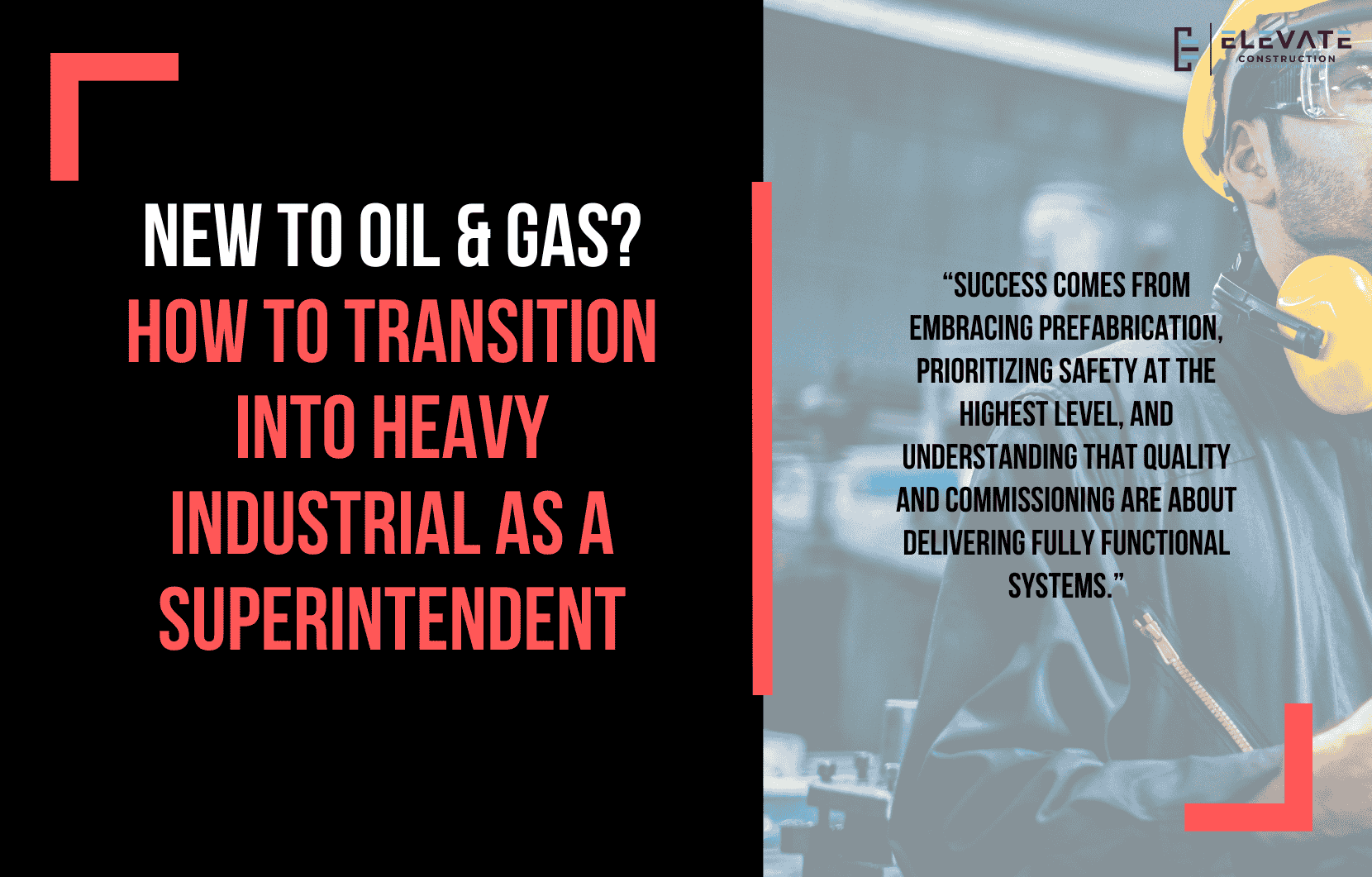Transitioning from Commercial to Heavy Industrial as a Superintendent
Introduction:
New to oil and gas? Wondering how to transition into heavy industrial construction as a superintendent? This blog is for you.
I get this question all the time, and it’s a great one. If you’re a commercial superintendent thinking about moving into industrial work, there are some big differences you’ll want to understand. Having worked on both sides, I’ll share advice that will help you bridge the gap. Add your own insights to mine, and you’ll have a roadmap to succeed in this new environment.
Commercial vs. Industrial Construction:
In many ways, commercial and industrial construction share similarities, scheduling systems, project management tools, and best practices. But the way projects unfold is different.
- Commercial projects lean on zoning and flow through geographic areas with multiple trade partners.
- Industrial projects, especially in oil and gas, are system-driven: tanks, piping, skids, hydronics, and heavy equipment dominate the workflow.
Understanding this distinction, zones vs. systems is the first step in making the transition.
Path of Construction:
- Commercial Path: Typically, zone-focused. For example, on a multi-story building, you’ll break a floor into zones, flow trades through each, and coordinate around site logistics.
- Industrial Path: Driven by systems. Construction often follows flow diagrams and one-line diagrams, sequencing installations (like tanks, skids, and piping assemblies) based on how systems tie together.
Both worlds rely on a path of construction, but the focus shifts dramatically from zones to systems.
Strategic Prefabrication:
- Commercial: Prefabrication is used strategically often for bottlenecks like underground electrical feeds, overhead MEP racks, or corridor assemblies.
- Industrial: Prefabrication is the default. Entire projects are modeled, prefabricated, and delivered in spools or kits of parts (think LEGO or IKEA).
This is where advanced work packaging (AWP) comes in, design, engineering, and construction packages flow seamlessly into prefabricated assemblies ready for installation.
Engineers Take the Lead:
In commercial work, architects and structural engineers often dominate. In industrial work, MEP and process engineers take center stage.
To succeed, you’ll need strong knowledge of:
- Mechanical.
- Electrical.
- Plumbing.
- Fire protection.
- Process piping.
Industrial superintendents essentially become MEP superintendents, focusing less on aesthetics and more on functional systems that power facilities.
Safety Compliance: A Higher Bar
Industrial environments are inherently more dangerous than most commercial jobsites. Hazards are severe often life-threatening.
That means:
- Zero tolerance for unsafe behaviors.
- Strict adherence to safety protocols.
- A culture where safety is non-negotiable.
This isn’t optional, it’s survival.
Quality Assurance & Commissioning:
In commercial work, a mistake might affect appearance. In industrial work, a mistake could compromise an entire system.
- QC is critical: Systems must be pressure-tested, verified, and functional.
- Commissioning is the endgame: Industrial projects aren’t about building structures, they’re about delivering fully operational systems. Every pipe, skid, tank, and electrical line must tie into a working whole.
As a superintendent, you’ll need to move beyond an assembly mindset and adopt a systems mindset.
Final Thoughts:
Transitioning from commercial to industrial construction is a challenge but one worth taking. You’ll dive into systems, prefabrication, commissioning, and advanced safety practices.
The good news? If you’re up for the challenge, you’ll thrive. Industrial projects are rewarding, complex, and impactful.
If you want to learn more we have:
-Takt Virtual Training: (Click here)
-Check out our Youtube channel for more info: (Click here)
-Listen to the Elevate Construction podcast: (Click here)
-Check out our training programs and certifications: (Click here)
-The Takt Book: (Click here)
Discover Jason’s Expertise:
Meet Jason Schroeder, the driving force behind Elevate Construction IST. As the company’s owner and principal consultant, he’s dedicated to taking construction to new heights. With a wealth of industry experience, he’s crafted the Field Engineer Boot Camp and Superintendent Boot Camp – intensive training programs engineered to cultivate top-tier leaders capable of steering their teams towards success. Jason’s vision? To expand his training initiatives across the nation, empowering construction firms to soar to unprecedented levels of excellence.
On we go


